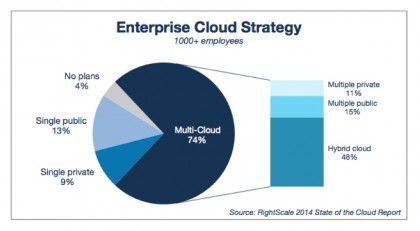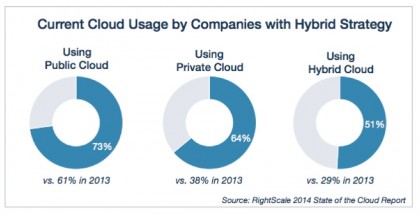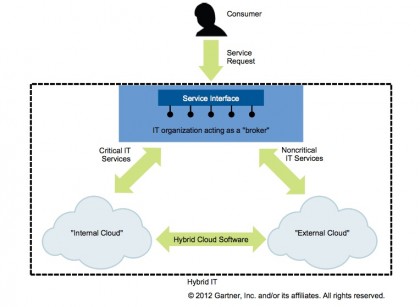How to build a hybrid cloud system for your SMB
The hybrid cloud is the future of your business

For small business owners watching the use of cloud computing accelerating around them, it can be easy to simply jump onto the bandwagon. However, cloud computing in the SMB sector is still cautious of moving wholesale to these hosted services, which is why a hybrid approach has become highly popular.
The RightScale 'State of the Cloud' report 2014 states: "Although the use of cloud is a given, enterprises often have different strategies for adopting cloud that incorporate varying combinations of public, private, and hybrid cloud infrastructure. Enterprises have multiple choices when it comes to cloud architecture because multiple cloud vendors are ready to provide services."

A hybrid approach to cloud computing fuses the security benefits of on-site servers, with the flexibility that the cloud offers. Indeed, according to RightScale nearly three-quarters of business use a hybrid model to manage their IT needs.
So what is hybrid cloud computing? Gartner define hybrid IT as: "The result of combining internal and external services, usually from a combination of internal and public clouds, in support of a business outcome."
What do CIOs need to consider?
Ernst & Young, as part of their insights into how to construct an effective hybrid IT platform, advise that CIOs should ask themselves the following questions:
1. How do I best manage a hybrid model in association with commercial and technology partners?
2. Is my existing IT infrastructure capable of supporting a hybrid model?
Are you a pro? Subscribe to our newsletter
Sign up to the TechRadar Pro newsletter to get all the top news, opinion, features and guidance your business needs to succeed!
3. What value will the development of a hybrid platform bring to my business?
4. How should I future proof the hybrid system put in place considering how fast cloud services are developing?
5. What are the key risk factors when building a hybrid IT platform?
6. Are commercial partners and customers able to adapt to the new hybrid system?
"Many organizations have now passed the definitional stage of cloud computing and are testing cloud architectures inside and outside the enterprise and over time, the cloud will simply become one of the ways that we 'do' computing, and workloads will move around in hybrid internal/external IT environments," said Chris Howard, managing vice president at Gartner.

Developing a model
As each small business is different, the hybrid platforms they develop will also be unique. The current state of your IT and your business' usage of cloud services will determine how a hybrid platform will be approached. Often, a hybrid system is developed because of security issues.
Financial data and other personal information that needs to be protected to comply with the Data Protection Act will often continue to be stored on-site with cloud-based services used for hosted applications such as office suites, and CRM (Customer Relations Management) systems.
Nigel Beighton, international VP of Technology and Product at Rackspace told TechRadar: "A hybrid cloud addresses security concerns head-on by providing a dedicated private cloud for all business critical applications like e-commerce platforms or customer data. This then connects to the agility and flexibility of a public cloud service, which can be scaled up or down as and when your business needs resource."
Also, according to Capgemini over 80 per cent of business using cloud services are buying new platforms and not migrating their existing IT. A hybrid cloud system here is seen as an addition and not a replacement for existing systems.

Mind the gap!
At the moment SMBs are still in the discovery phase of how cloud IT could impact on their business.
Pravin Kothari, CEO at CipherCloud commented: "Hybrid is the future of the enterprise. It's unlikely that most companies will take an all or nothing approach to cloud. The survival of mainframes into the cloud age underscores that certain parts of infrastructure will not move to cloud.
"There are security advancements being made for both on-premise and cloud environments. A major shift for security has been the move from device centric to information centric protection."
A hybrid approach offers SMBs a number of distinct advantages:
• Existing IT infrastructure and investments are protected.
• The cloud can enhance existing business processes for little additional cost.
• More flexibility is possible with a hybrid cloud approach.
• Security concerns are resolved by retaining on-site storage for sensitive data.
• Expansion of business services via the cloud can be completed, as these are needed.
• Efficiency gains can be made instantly by adopting hosted services.
The best of both worlds
RightScale concludes: "Over the last twelve months, the cloud landscape has continued to evolve at a rapid rate. Google and Microsoft announced general availability of their respective IaaS (Infrastructure as a Service) offerings. VMware threw its hat in the ring with vCloud Hybrid Services, and IBM purchased SoftLayer.
"On the private cloud front, OpenStack continued to add new capabilities, while VMware deprecated vCloud Director and repackaged its vCloud Suite. Most organizations are evaluating a variety of cloud alternatives."
What is clear is that a hybrid approach to cloud service will be the norm for many SMBs. According to the last Future of Cloud Computing survey "Forty-two per cent of organizations who responded are currently emphasizing hybrid clouds in their cloud computing strategies, and this is expected to increase to 55 per cent in five years' time."
The hybrid approach, then, protects the investment that has already been made in IT infrastructure, yet enables your business to expand and take practical advantage of the cloud. Embracing the hybrid cloud now will enable your enterprise to remain competitive far into the future. For SMBs hybrid is the best of both worlds.